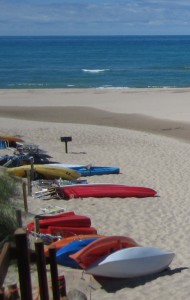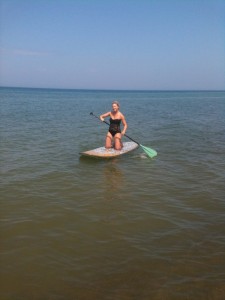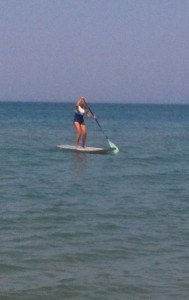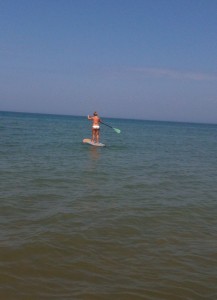 In the last few years, one of the most popular beachfront pastimes has been kayaking. These little boats can be maneuvered nicely even by amateurs and are designed to hold one, two, or three passengers. They come in a variety of colors, price ranges, weights, and sizes, some even light enough for a child to drag across the sand.
In the last few years, one of the most popular beachfront pastimes has been kayaking. These little boats can be maneuvered nicely even by amateurs and are designed to hold one, two, or three passengers. They come in a variety of colors, price ranges, weights, and sizes, some even light enough for a child to drag across the sand.
As popular as kayaks have been, though, this year a new beach craze took over: paddle-boarding. (I first called it water-boarding and was quickly corrected.)
 Paddle-boards resemble surfboards, though users tell me there are many differences: length, width, weight, rudders, materials. But on a calm-water day at our beach, we might see a dozen or more boards in action, looking every bit like those using them have learned to walk on water.
Paddle-boards resemble surfboards, though users tell me there are many differences: length, width, weight, rudders, materials. But on a calm-water day at our beach, we might see a dozen or more boards in action, looking every bit like those using them have learned to walk on water.
It’s no surprise that the younger the participants, the easier it is to watch them. As geriatrics climb aboard (like me), it’s not so appealing. “Wobble” is the operative word, and strange, staccato noises become part of the effort. “Oops! Yikes! Oh-oh!”
My son-in-law Adam brought his paddle board from Florida when his family visited this summer, and his command of the sport was impressive. He had a head start, though, having grown up on short and long skateboards, and mountain bikes. Now he’s passing along his skills to his children, who will probably grow into non-wobbly paddlers in short order.
Recently Linnea texted me a video of a paddler-wanna-be. Five year old Skylar was balancing perfectly on Adam’s wheeled long board, making her way down the road in front of their house with a paddle that looked suspiciously like a broom. Surely she was thinking, “Just like Daddy!” as she successfully moved along.
Children often follow the behavior of the adults in their lives, learning to love what they love. This works to their advantage when the object of their affection is positive, such as a love for water sports or any number of other good things. But the same modeling takes place with negative stuff, and if we’re not careful, children will adopt habits we’re actually trying to break. It’s devastating when they copy “our bad.”
Maybe that’s why God gives us unlimited opportunities to model good behavior in front of them. It’s much easier to clean up our lives when we know we might be copied, and God knew that. But he also wants adults to have models to copy, too.
His idea was to provide a perfect one for us, someone we could imitate without any negative consequences. So that’s what he did, and his name is Jesus.
* * * *
 As for my learning to paddle-board by modeling my efforts after Adam’s example, it didn’t happen. I think for me it will be better to “master” the sport vicariously….
As for my learning to paddle-board by modeling my efforts after Adam’s example, it didn’t happen. I think for me it will be better to “master” the sport vicariously….
through Skylar.
“Watch what God does, and then you do it, like children who learn proper behavior from their parents.” (Ephesians 5:1)

